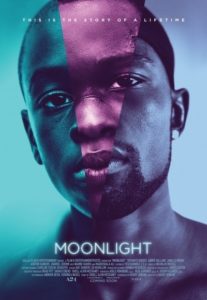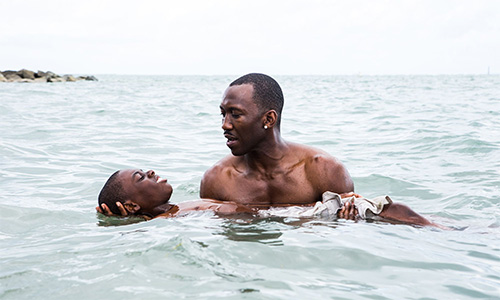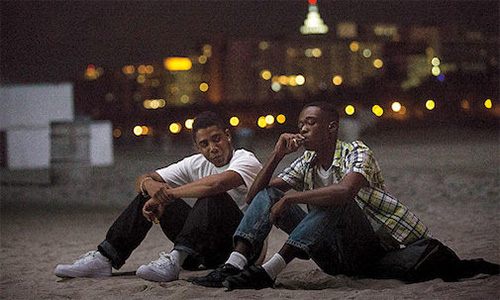 Barry Jenkins’ (Medicine for Melancholy) Moonlight is an ambitious film in many ways. Though it mainly revolves around the uncertainty of being gay, it also touches on many of the other important issues of the day, including adolescent bullying, drug abuse, masculinity, broken relationships, and poverty. The acting in this movie is out of this world. Never does this feel like a movie to me. Instead, it feels like you are just an invisible camera watching three different stages of a male discovering and dealing with his sexual identity in the hardships of a destitute part of Miami, Florida. The film is divided into three chapters. All are centered around Chiron. At age 6 or 7, he is referred to as Little. At age 16 or 17 (the chapter that gets the most focus), he is Chiron. And for the last chapter, he’s 26 or 27 and goes by Black. He’s equally conflicted in all three different stages of his life. The simplicity of this movie is its strength. If you like artistic movies that center around a real story with characters who feel real, you will find this movie riveting.
Barry Jenkins’ (Medicine for Melancholy) Moonlight is an ambitious film in many ways. Though it mainly revolves around the uncertainty of being gay, it also touches on many of the other important issues of the day, including adolescent bullying, drug abuse, masculinity, broken relationships, and poverty. The acting in this movie is out of this world. Never does this feel like a movie to me. Instead, it feels like you are just an invisible camera watching three different stages of a male discovering and dealing with his sexual identity in the hardships of a destitute part of Miami, Florida. The film is divided into three chapters. All are centered around Chiron. At age 6 or 7, he is referred to as Little. At age 16 or 17 (the chapter that gets the most focus), he is Chiron. And for the last chapter, he’s 26 or 27 and goes by Black. He’s equally conflicted in all three different stages of his life. The simplicity of this movie is its strength. If you like artistic movies that center around a real story with characters who feel real, you will find this movie riveting.
In chapter one, Little lives in a drug-filled section of Miami. Drugs are purchased on the street in the middle of the day. Little is a young boy and still a bystander, but he’s not so innocent. His mother (Naomie Harris – Southpaw, Skyfall) is addicted to drugs that Juan (Mahershala Ali – Free State of Jones, The Curious Case of Benjamin Button) is supplying. At the start of the movie, Juan doesn’t know that Paula is Little’s mother, but both parties are well aware that she’ll get them from somewhere else if she doesn’t get drugs from him. Juan himself does not do drugs, but he lives a well-to-do lifestyle from the profits he earns on the streets.
Early in the movie, we meet Little as he gets chased down by a group of young boys looking to bully him. He fans safety in a rundown abandoned house. Little hides behind boarded windows, not a fighter himself, while the three boys pelt the house with rocks. Eventually, the boys retreat, and this is when Juan and Little meet for the first time. Little doesn’t say much, reserved by nature and skeptical of everyone he meets. Still, he does accept his offer of a meal and a night at the home of Juan and his girlfriend Teresa (Janelle Monáe – Made in America) before taking him back home to his drug-addicted mom, Paula. Paula loves her son, but the drugs come first to her. As a result, she is unable to provide for him as a caregiver. Little also doesn’t do the best job of standing up for himself. He’s soft. He doesn’t stand up for himself and play rough with the other boys. He is said as much by his only friend, Kevin.

In Act II, Chiron (Ashton Sanders – Straight Outta Compton, The Retrieval) is a high school student going through many of the same issues that many high school students go through…plus a couple more. Juan is no longer a part of his life (we are told he has died, but we don’t really learn why), but Teresa still plays a key role. So does his mother, Paula, who is still heavily addicted to drugs. Kevin (Jharrel Jerome) is also significant in Chiron’s life. Act II is the meat and bones of this story. Chiron is trying to do right by attending school and caring for his mother. He is trying to figure out his sexuality, and while he certainly is not portrayed as being outwardly gay at this point, many in his school make references that imply that he is. He’s constantly teased and suffers a tremendous amount of bullying. But he’s continually turning the other cheek. Ultimately, though, how much can we take before we break? There’s more than meets the eye in Act II. It’s impossible not to love Chiron here and experience his highs and lows with him. We want what is best for him, but we get the sense early that this differs from what’s in store for him. There is a poignant scene in this chapter that is both beautiful (in the moment) and tragic (because of its consequences) that you won’t find in a less-caliber movie. It further identifies the audience with Chiron regardless of their feelings about homosexuality.
Act III takes place ten years after Act II and is the murkiest of the three. As a standalone, it might set the scene for a completely different movie. But, here, it almost feels out of place. Is it a closing chapter? It isn’t. While the first two acts set up the final act to answer many of the questions presented, Act III still needs to answer. It only offers more. And the idea of many of these independent art-house-type movies is to leave you wondering; Moonlight didn’t have to do that. While the Chiron we meet in Act III has many similarities to the one in Act II, he’s very different in many ways. From a physical standpoint, he looks like a completely different man. And, while circumstances change people, the person who he seemed so hard to strive not to be is the person he became. The tone of Act III is dark. Its pace could be faster. It doesn’t feel like a conclusion. The primary players, including Chiron’s mother and another person, are still around. Chiron has developed into someone we have met in Act I, but I’m not sure everyone will pick that up, even though it’s obvious. Instead, we want Chiron to be something more or, at least, a continuation of the character we’ve seen developed. Instead, we see a character with a rough exterior still hiding some suppressed feelings, which I’m not sure many would suppress for the better part of their 20s.

Moonlight is a heavy movie. Most indie fans will enjoy it. Most blockbuster movie fans will not. I get more into independent films and less into big-budget ones each year. And I come to understand why people like Mark Ruffalo (The Avengers franchise), Kate Winslet (Divergent franchise), Jeremy Renner (The Avengers, Mission Impossible), Ben Affleck (Batman, Justice League), and so many others involve themselves with these, sometimes awful, big-budget series, it’s so they can earn the money that they deserve to earn while allowing themselves to take much smaller paychecks so that they can take on these roles that can’t pay them as much, but will enable them to portray characters they want to represent and involve themselves in movies that can strike a chord with the critics.
While Moonlight doesn’t have any big-name actors, it’s likely to earn Oscar nominations for Best Picture, Best Director, Best Supporting Actor (Ali), and Supporting Actress (Harris). I’d recommend seeing it as long as you know when you go in that it’s not the feel-good movie of the year and that you might have more questions answered than you have answered. Even with a couple of (hopefully) good films still to be released, Moonlight finds its spot in my end-of-year Top 10. It’s not a perfect movie, though, and many critics use the words perfect or near-perfect to refer to movies such as Moonlight, Sully, and La La Land.
Plot 9/10
Character Development 9/10
Character Chemistry 9/10
Acting 9.5/10
Screenplay 8.5/10
Directing 8.5/10
Cinematography 9/10
Sound 9/10
Hook and Reel 9.5/10
Universal Relevance 10/10
91%
Movies You Might Like If You Liked This Movie
***Spoilers***
For as good as this movie was, it wasn’t great. There were a lot more questions than there were answers. I understand that sometimes, the more artistic movies want to leave you pondering the movie long after it’s over. In this movie, you wanted more. Chiron said that he had only one experience with Kevin as a teenager. And then he said he didn’t touch anyone in the last 10+ years. What had he been doing during that time? Was Kevin special so special to Chiron that he didn’t want anyone else? Was he scared? Did he deny himself because he didn’t want to be gay? Was he scared of a relationship? Ten years is a long time to go without having a sexual relationship with someone. Is it unusual? No, I don’t think it is for a lot of people. For others, 10 days is too long. I believe there are people in this world who are very sexual at one time but then not during others. We’re all built differently. But it would be good to know the rationale behind Chiron’s. We didn’t learn his reasons, and I wanted to know why. I am more okay with the ambiguity Chiron and Kevin’s relationship left behind. Do they get together? Is it just for the night, or is it something more long-term? What sort of effect does that have on Chiron? I assume it is okay to leave us to draw conclusions. This seems like a logical place to end the movie. But it didn’t have to end that way. We are so invested in Chiron by this point that it would be more than acceptable for Jenkins to give us a satisfying conclusion.
Also, Chiron beefed up physically from Act 2 to Act 3. We aren’t told why, but we can assume it’s because he needed to defend himself in jail and be more of a physical presence on the streets when he was selling drugs. Perhaps he just wanted to be more like Juan, his role model from Act I. But it would be good to know why he started pumping iron and wearing grills. Likewise, I would have enjoyed learning more about finally convincing Paula to get clean and maybe a more sentimental moment between mother and son.
Overall, this is an excellent movie—one that hasn’t been told before in this way. It could be better, though. It’s quietly becoming that movie everyone knows something about, but not many people have seen it. Nevertheless, it’s a must-watch.